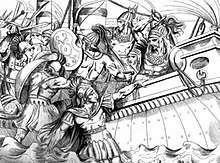Cynaegirus
Cynegirus or Cynaegirus /ˌsɪnəˈdʒaɪrəs/ (Ancient Greek: Κυνέγειρος Kunégeiros or Κυναίγειρος Kunaígeiros; died 490 BC) was an ancient Greek general of Athens and had three siblings. His two brothers were the playwright Aeschylus and Ameinias, hero of the battle of Salamis, while his sister was Philopatho (Greek: Φιλοπαθώ), the mother of the Athenian tragic poet Philokles. He was the son of Euphorion (Greek: Ευφορίωνας) from Eleusis and member of the Eupatridae, the ancient nobility of Attica.[1]
Cynaegirus | |
|---|---|
 Cynaegirus grabbing a Persian ship at the Battle of Marathon (19th century illustration). | |
| Native name | Κυνέγειρος or Κυναίγειρος |
| Born | Eleusis |
| Died | 490 BC Marathon |
| Allegiance | Athens |
| Rank | General |
| Battles/wars | Battle of Marathon |
| Memorials |
|
| Relations | |
The Battle of Marathon
In 490 BC Cynegeirus and his brothers Aeschylus and Ameinias fought to defend Athens against Darius's invading Persian army at the Battle of Marathon. According to Plutarch, Cynegeirus was one of the Athenian Generals.[2]
Despite their numerical superiority, the Persians were routed and fled to their ships. The Athenians pursued them, and Cynegeirus in his attempt to hold on the stern of a Persian ship with his bare hands had his hand cut off with an axe and died.[3][4][5] According to another version of his death, recorded by the Roman historian Justin, when Cynaegyrus lost his right hand, he grasped the enemy's vessel with his left, but Persians cut off this hand too. Here the hero, having successively lost both his hands, hangs on by his teeth, and even in his mutilated state fought desperately with the last mentioned weapons, "like a rabid wild beast!"[6]
There was a custom at Athens that the father of the man who had the most valorous death in a battle should pronounce the funerary oration in public. The father of Cynaegirus and the father of Callimachus had an argument about that. Polemon of Laodicea declaimed first on behalf of Cynaegirus and then on behalf of Callimachus.
The incident of the heroic death of Cynegeirus became an emblem of cultural memory in ancient Greece and was described in literature in order to inspire patriotic feelings to future generations.[7] It was also painted by the ancient Greek painter Polygnotus on the Stoa Poikile in Athens in 460 BC, while the ancient traveler and geographer Pausanias described the painting in his 2nd century AD work.[3]
The Suda encyclopedia mentioned Cynaegirus.[8]
At Elefsina there is a monument dedicated to him.
References
- Bates, Alfred (1906), The Drama: Its History, Literature, and Influence on Civilization, Vol. 1, London: Historical Publishing Company
- Plutarch, Moralia. Greek and Roman Parallel Stories "The Athenians, however, contemning the barbarian host, sent out nine thousand men, and appointed as generals Cynegeirus, Polyzelus, Callimachus, and Miltiades."
- van Dijkhuizen, Jan Frans (2004). Living in posterity: essays in honour of Bart Westerweel. Uitgeverij Verloren. p. 242. ISBN 978-90-6550-839-3.
- Herodotus Book 6: Erato, 114 "...Kynegeiros the son of Euphorion while taking hold there of the ornament at the stern of a ship had his hand cut off with an axe and fell; and many others also of the Athenians who were men of note were killed."
- Plutarch, Moralia. Greek and Roman Parallel Stories "Cynegeirus, seizing hold of a Persian ship that was putting out to sea, had his hand chopped off"
- Dictionary of Greek and Roman Biography and Mythology by William Smith (1870).
- Maximus Valerius (2004). Memorable deeds and sayings: one thousand tales from ancient Rome. Hackett Publishing. p. 90. ISBN 978-0-87220-674-8.
- Suda Encyclopedia